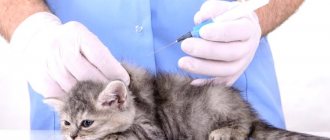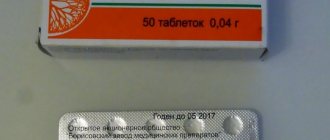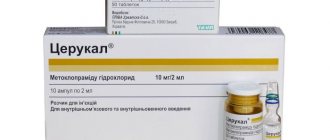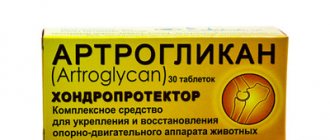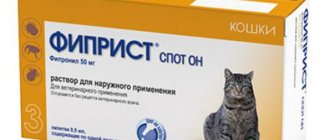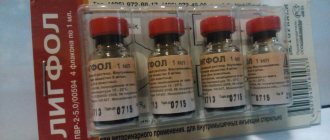Cystitis is a problem that can cause serious inconvenience not only to people, but also to animals, in particular cats. Typically, if symptoms are observed, treatment involves taking antibiotics, for example, a drug called Monural. We will tell you in more detail how this medicine is used in “cat” therapy, how much it needs to be given, what precautions to take and what other medications will help relieve your pet from cystitis.
ShowHide
- Chemical composition
- Release form
- Can cats be given Monural?
- The principle of action of the drug
- Indications for use
- Dosage and instructions for use
- Contraindications and side effects
- Storage conditions and expiration dates
- Analogues of the drug
Can cats be given Monural?
“Monural” is indeed used by veterinarians to treat cystitis in cats, but this does not mean that such a drug can be used independently. When prescribing Monural to a cat, two fundamental rules must be observed:
- The diagnosis of cystitis (inflammation of the bladder) was confirmed.
- Milder drugs, including those of plant origin or specialized veterinary drugs, did not give the desired effect.
You can suspect cystitis in a cat, in addition to frequent urination, based on the following symptoms:
- painful and tense abdomen (lower part);
- strong thirst;
- lack of urine when constantly trying to visit the litter box;
- change in the color and smell of urine, the appearance of foreign impurities in it;
- dragging of the hind legs, especially after visiting the tray;
- restless turning from side to side while resting (the animal is trying to find a position in which it will not feel pain and discomfort);
- plaintive meowing while visiting the tray;
- relieving minor needs in inappropriate places, often very demonstrative (the animal thus tells the owner what the problem is).
Important! If inflammation of the bladder is not diagnosed at an early stage, it can become chronic, leading to intoxication and the so-called nephrotic syndrome, accompanied by severe swelling and indicating damage to the entire urinary system. In addition, cystitis often provokes the development of urolithiasis.
Despite the fact that all these signs are very eloquent, they are only a reason for diagnosis, since cystitis cannot be detected “by eye”. In any case, before prescribing Monural to an animal, a good veterinarian must verify the diagnosis. To do this, it is possible to use several methods:
- general urine analysis;
- bacteriological culture;
- blood test (general or biochemical);
- smear on the flora of the genital tract;
- Ultrasound examination of the pelvic organs (bladder, kidneys).
But even after an accurate diagnosis has been established, Monural should be considered as a last resort. The fact is that after such a strong drug, it can be very difficult to find another antibiotic. On the other hand, timely detection of signs of inflammation of the bladder in a cat makes it possible to effectively treat the animal using more gentle therapy, in particular, using antimicrobial and restorative agents such as:
- "Sinulox" is an American-made veterinary antibiotic based on amoxicillin;
- “Cyston” is a herbal preparation with anti-inflammatory and diuretic effects;
- "Canephron" is an antispasmodic, diuretic, analgesic and anti-inflammatory drug based on plant materials;
- “Kotervin” is a medicinal herbal mixture for the treatment of urological diseases in cats;
- “Hexamethylenetetramine” (“Urotropin”) is a urological antiseptic;
- “Phenyl salicylate” (“Salol”) is an antiseptic that is effective against pathogenic intestinal microflora;
- “Sulfadimezin” is a sulfonamide drug with an antimicrobial effect;
- "Furadonin" is a urological antiseptic;
- “Stop Cystitis” is a feed additive that normalizes the functioning of the urinary system.
Did you know? In the United States, the annual cost of treating urinary tract infections is more than $2.5 billion, with these diseases accounting for at least 15% of all antibiotics prescribed, and the total cost of such drugs per year reaches $1 billion.
This is interesting: What to do if your cat has wax in his ears
Can a cat monural with cystitis?
Group: User Messages: 1 Registration: 2.9.2013 User No.: 116087
Please tell me who has encountered this.
Neutered cat. 7 years. The disease worsens every three months. He begins to meow when he pees, then blood appears in his urine. Doctors diagnose urolithiasis and cystitis. They did an ultrasound of the kidneys, it looks like there are salt crystals in the urine. There don't seem to be any stones.
All doctors treat with a standard regimen - NOSHPA plus a HEMOSTATIC (dicinon, for example) plus a urine test with subtitration for antibiotics, they find a bacterium there and inject it with the appropriate antibiotic.
But every time—once every three months—the exacerbation recurs. I hate all veterinarians and have already hesitated to kill the cat.
If anyone has encountered this, please tell me what to do. Moscow.
Thanks in advance everyone. Alexandra.
Group: Old-timer Posts: 14843 Registration: 1/16/2008 From: Moscow, Altufyevo User No.: 27713
Group: Old-Timer Posts: 15597 Registration: 9.2.2008 User No.: 28683
Group: Old-Timer Posts: 2476 Registration: 12/11/2011 User No.: 93826
My cat had exacerbations with peeing ichor once every two years on average. Then we switched to medicinal food, then to preventive food, and after several months (4-5) we returned to the normal diet. We ate “Hills s/d”, then “Hills c/d” and then the regular “Hills” for adults, and after some time for the elderly. Take a urine test - we do it at ChanceBio - and it will become clear what crystals are in the urine and what acidity is (is it necessary to acidify the urine, for this there is "Cat Erwin", there is a delicious "Urinari Tract Support"). When changing Hills diets, I always called their hotline (available on any Hills package) and consulted in detail with veterinarian Galina Nikolaevna. She is a very knowledgeable specialist and a friendly person.
She will tell you, like me, that cystitis cannot be cured, but it is possible to maintain balance without exacerbations. For cystitis, it is better not to dry food, but to wet food - canned food or Hill's spiders. But you can use a mixed feeding scheme. We get food here - https://zverovod.ru/category/cats_veterinary_diet
Premium food is noticeably cheaper here; the store specializes in purchasing them. Save up the discount, all your purchases will be added.
You can also treat cystitis instead of Hills with the Purina Vet diet. diet,” I gave another cat, younger and stronger, a long time to give them canned food and dry food, here - https://zverovod.ru/product/purina_ur_urinary_feline/ And the cost is cheaper.
In general, you need courses, twice a year, on a “vet diet for urolithiasis and cystitis.”
Antibiotic for people: when will a cat need it?
In case of hypothermia, the animal may develop various diseases, including cystitis.
Veterinarians prescribe Monural for cystitis. Many members of the cat family are susceptible to this disease. It develops against the background:
- hypothermia;
- infectious and chronic diseases;
- metabolic disorders;
- stressful situations;
- injuries in the abdomen/back area.
It is important to identify the disease at an early stage in order to provide timely assistance. The main indications for prescribing Monural by specialists may be:
- acute form of bacterial cystitis;
- infection of the urinary system;
- urethritis;
- acute relapse of cystitis.
Contraindications
The medicine is not suitable for pets if they have:
- renal failure;
- pregnancy/lactation period;
- intolerance to the components contained in the composition.
Indications for use
Indications for the use of Monural for the treatment of cats, taking into account the precautions mentioned above, are:
- bacterial cystitis in acute form;
- relapse of cystitis in acute form;
- damage to the urinary system of a bacterial nature (including postoperative urinary tract infections);
- inflammation of the urethra (urethritis).
It must be said that the causes and nature of idiopathic cystitis have not yet been clarified by scientists. However, the most adequate way to treat this disease is symptomatic therapy: since the nature of the disease is unknown, you just need to help the animal cope with the painful condition.
For this we use:
- antispasmodics;
- analgesics;
- diuretics;
- antiseptics;
- hemostatic drugs if cystitis has acquired a hemorrhagic form.
Dosage and instructions for use
Veterinarians prescribe Monural in different ways. Most sources contain recommendations to use a one-time dose repeated after 10 days. It is better that the cat is hungry while taking the drug, since the presence of food in the gastrointestinal tract slows down the absorption of the drug. For the same reason, you should not feed the animal for at least two hours after taking Monural. To determine the dosage, it is important to pay attention to the weight of the package, since, as already mentioned, the drug is available in different volumes.
Important! Veterinarians advise administering no more than one “cube” of liquid drug to a cat at one time, after which the animal should be allowed to rest.
Depending on this, and also taking into account the weight of the cat, the contents of the package should be divided:
- fosfomycin 2 g - into 3-4 parts;
- fosfomycin 3 g - 5-6 parts.
The resulting portion should be diluted with a small amount of water (2-3 tablespoons) until completely dissolved, take the resulting mixture into a disposable syringe without a needle and carefully inject it into the cat’s mouth. In this case, you need to firmly fix the pet’s head with one hand, and with the other, insert the tip of the syringe into the corner of the mouth between the cat’s back teeth and only then inject the medicine. If the animal does not want to open its mouth, you can inject the mash onto the back of the tongue. Immediately after administering the drug, it is necessary to lift the animal’s head up and hold it until the medicine is swallowed.
Video: how to give medicine to a cat
“Monural” is a heavy drug, so it cannot be used without a doctor’s prescription, especially for the treatment of kittens under 1 year old or elderly cats. However, this rule is mandatory for all antibiotics without exception: the need for their use, dosage and course can only be determined by a doctor, in this case a veterinarian. There are, for example, cases where doctors determined a slightly different procedure for taking Monural, in particular:
- course for three days with a single dose of 0.1 packet;
- course for two days, 0.25 or 0.3 packets, etc.
In case of an overdose, the cat is poisoned with Monural.
Whatever option is chosen, it should be remembered that in order to increase the effect of treatment and minimize the risk of side effects, it is very important to try to eliminate the cause of the disease and provide the pet with proper care. In particular, you need to know that cystitis is often a consequence of another acute or chronic disease, stress, hypothermia, metabolic disorders, abdominal or back injuries.
Important! For three months after complete recovery, the cat should not be taken to exhibitions or bred.
Therefore, during the treatment of inflammation of the bladder, the cat must be at rest and warm (you cannot warm the animal’s belly, you just need to protect the animal from drafts and not allow it to sleep on a cold floor). During this period, it is better to introduce special foods into the diet for the treatment and prevention of kidney and genitourinary diseases.
Mode of application
You can help your cat consume the solution with a syringe, which is applied to the corner of the mouth so that the pet does not spit out the medicine.
This drug for cats is easy to use:
- Dosage. It is necessary to give one third or a quarter of a 2 gram pack of Monural. Remember, only a veterinarian can prescribe the correct dosage.
- Give to the cat once in the form of a solution, and after 10 days repeat the procedure.
- To simplify the procedure, a syringe is used. Inject the liquid into the corner of the cat's mouth to prevent him from spitting out the medicine.
Substitute drugs
Cystitis is a common disease among cats. If Monural is not suitable for your pet and causes side effects, then there are a number of drugs with a similar effect. Veterinarians also prescribe:
- "Furadonin";
- "Urolesan";
- "Nocilin";
- "Amoxicillin."
It is important to promptly notice symptoms in your cat that indicate bladder problems. In this case, you should contact a veterinary clinic, where a specialist will tell you about further treatment. When prescribing Monural, you should adhere to the rules of use and dosage. During treatment, the owner needs to monitor the animal's behavior. If vomiting, upset, or other side effects occur, you should stop giving the drug.
This is interesting: Ural Rex - characteristics of the breed
What's in it?
"Monural" is available in different forms. For cats, veterinarians prescribe powder, which is then diluted to a solution. The product prevents the proliferation of pathogenic microorganisms by blocking the synthesis of the bacterial cell wall. The drug has an antibacterial effect due to its components. Active substances accumulate on the membranes of the bladder, which protects it from cystitis. It also helps strengthen general immunity. The main components are:
- fosfomycin trometamol;
- natural flavor (tangerine/orange);
- saccharin;
- sucrose.
According to clinical trials, Monural works against many pathogens, and also reaches maximum concentration after 2 hours.
Chemical composition
- quickly (maximum concentrations are reached within 120–180 minutes after administration);
- prolonged (more than 48 hours);
- relatively safe (does not bind to blood proteins).
In addition, important advantages of fosfomycin include the fact that it:
- compatible with many other antibiotics, exhibiting a synergy effect in complex therapy with them (a property in which the result from the action of two drugs together is more effective than the simple sum of the results from the action of each of them separately);
- is excreted from the body mainly along with urine unchanged and only in a small part - with bile, which reduces the likelihood of developing intestinal dysbiosis;
- almost not causing the formation of resistance in bacteria, especially from the genus Enterobacteriacea (this includes parasites such as plague and E. coli, salmonella and many others).
Contraindications and side effects
There are three standard contraindications for the use of Monural in the treatment of cystitis in cats:
- renal failure;
- individual intolerance or hypersensitivity to the active substance and other components (do not forget that the drug contains sugar and chemical flavorings);
- pregnancy and lactation period.
To the above, we should add the need to be especially careful when using a potent antibiotic when we are talking about kittens, elderly cats, as well as animals with weakened immunity, including due to the presence of serious chronic diseases. Inflammation of the bladder can appear in a cat periods, again and again, even with complete recovery. Therefore, it is important to monitor the animal’s behavior and promptly show it to a doctor. If these contraindications and warnings are ignored, if the recommended dosage is violated, and even for no apparent reason, taking Monural can cause poisoning in the animal, manifested in severe bouts of vomiting, intestinal upset (diarrhea), excessive drooling, loss of coordination. At the first signs of intoxication, the cat should be immediately taken to the veterinarian, and if this is not possible, give it as much water as possible.
Important! "Monural" has pronounced nephrotoxicity. There are cases where cats developed kidney failure after taking the drug.
Use of Monural in cats for cystitis
5343Pavel
Cystitis is a fairly common disease among cats and dogs. This is an inflammation of the bladder. Both adults and kittens suffer from it. But in cats, due to the structural features of the genitourinary system, cystitis is more common. Monural for cats is used for treatment.
In cats, the urethra is wide, but in cats it is long, it bends and narrows. Because of this, salt plugs form in cats, which prevent urine from being excreted. Neutered cats are more likely to have cystitis than non-neutered cats. In castrated cats, blood stagnates in the genitals, which leads to swelling. Edema provokes spasms, stagnation of urine, and precipitation of salts. They then develop into chronic inflammation of the bladder. It is very important to diagnose cystitis as early as possible. But in the early stages it can be difficult to determine cystitis, especially if the cat is walking outside.
© shutterstock
It is much easier to notice its symptoms in pets. When there is an inflammatory process, the cat experiences pain when visiting the toilet. The animal often visits the toilet, meows pitifully, and angrily scratches the toilet with its claws. The process of urination takes a long time. If the cat does go to the toilet, you need to carefully examine the discharge. They may be mixed with blood, pus, or have an unpleasant odor. In animals that visit the street, diagnosing this disease is difficult. But at home, the cat will lie indifferently or make sounds of pain.
If you suspect that your cat has a bladder infection, you need to palpate his stomach. If the bladder is inflamed, the animal will experience pain in the lower abdomen . If cystitis is not diagnosed as early as possible, then the animal develops intoxication syndrome. The cat's temperature rises and vomits. And when swelling of the paws appears, it means that nephrotic syndrome has developed. This is a sign that cystitis has affected the upper and lower parts of the urinary system.
Causes of inflammation in the bladder:
- infectious diseases;
- metabolic disease;
- stress;
- hypothermia;
- abdominal and back injuries.
But cats don’t always show that they are in pain. If there is a suspicion of cystitis without external manifestations, then you can get tested in the laboratory. The following tests are done:
- general blood analysis;
- general urine analysis;
- Ultrasound of the bladder and kidneys;
- biochemical blood test with determination of the renal-hepatic complex.
Sometimes cystitis develops into urolithiasis (urolithiasis). During this disease, stones or sand form in the bladder, kidneys or urethra. With urticaria, be sure to follow a diet and water regime. The stones are removed surgically. Small stones are removed using a catheter. It is placed in order to expand the urinary canal. It will become wider and the stones will come out on their own.
Inflammation of the bladder always requires antibiotics. Monural is often prescribed for cats with cystitis. However, its use is justified when weaker antibiotics do not help. Monural is a strong antibiotic. This is a human drug sold in pharmacies. Monural is available in granules of 2 and 3 grams. The drug is dissolved in water and used orally. The active ingredient in the drug Monural is fosfomycin.
Monural affects many types of bacteria. The drug is rapidly absorbed and reaches its maximum concentration in the blood within 2 hours.
Dosage of Monural for a cat: 1/3 or 1/4 of 2 grams once. After 10 days, Monural is given to the animal again. It is better to give the solution using a syringe without a needle, injecting the drug into the corner of the mouth so that the animal does not spit it out. However, the correct dose will be calculated by your veterinarian.
In case of an overdose, the cat is poisoned with Monural . In this case, the animal experiences vomiting, salivation, dizziness, and diarrhea. You need to give the animal plenty of water and immediately show it to the doctor.
Cystitis often develops into a chronic form. Inflammation of the bladder can appear in a cat periodically, again and again, even with complete recovery. Therefore, it is important to monitor the animal’s behavior and promptly show it to a doctor.
IMPORTANT!
VETERINARIAN CONSULTATION REQUIRED. INFORMATION FOR INFORMATION ONLY.
Share with friends
Article rating
Symptoms of the disease
At the onset of the disease, signs of cystitis in a cat are not easy to diagnose: she visits the litter box more often than usual, does not allow her belly to be touched, and is thirsty more often. It would seem that these are the symptoms of cystitis. However, this behavior is typical of cats susceptible to any other disease or under stress. Therefore, in most cases, cat owners turn to the veterinarian too late, when cystitis in the cat becomes obvious. The symptoms become too obvious:
- cats go to the litter box even more often;
- sitting on the tray, they make plaintive sounds;
- experiencing sharp pain in the bladder, even well-mannered cats leave puddles in different places in the house;
- it occurs that a pet demonstratively urinates on its owner’s clothes;
- urine becomes darker in color, sometimes it contains drops of blood or grayish purulent inclusions. The urine of cats is of heterogeneous composition, cloudy, with an unpleasant odor;
- after defecation, the cat comes out of the tray with difficulty, its hind limbs become dragged, its legs are bent;
- during periods of rest, they very carefully turn to the other side, as they experience severe discomfort in the groin of the abdomen;
- The cat’s stomach is tight and very painful;
- Sometimes your furry pet cannot pee normally, although she endlessly visits the litter box and strains more and more.
Idiopathic cystitis
Cystitis in cats usually occurs in acute or chronic forms. In the second case, the appearance of domestic cats can make a good impression, due to the fact that they occasionally suffer from short-term pain during urination. But this does not mean that chronic cystitis is not dangerous, because an exacerbation of the disease can occur at any time. In addition, such a sluggish development of the disease complicates the functioning of the entire body, weakens the immune system and reduces the life of the cat.
Most often, doctors find it difficult to diagnose idiopathic cystitis in cats. Its difference is that there are no obvious reasons for the development of pathology. Symptoms of the disease can be well expressed or completely subtle; the cat may appear to be quite healthy or, conversely, can barely stand on its feet. But, apart from the immediate symptoms of cystitis, the veterinarian cannot find any abnormalities in the functioning of the body that would stimulate the development of this disease.
Hemorrhagic cystitis
Veterinarians diagnose “hemorrhagic cystitis” when the mucous membrane of the bladder is so damaged that blood arteries and capillaries rupture and blood is present in the urine. The development of this disease can also occur in both chronic and acute forms. The acute form of this disease is dangerous due to its results. Possible blockages of the ducts with blood clots, anemia, and general intoxication of the body.
Most often, hemorrhagic cystitis occurs when stones form in the kidneys or urinary tract. Treatment with the necessary medications must be started immediately!
Storage conditions and expiration dates
"Monural" refers to potent drugs, which should be taken and stored with extreme caution due to the high risk of poisoning and other complications (the so-called list B). Such drugs in pharmacies should be placed under lock and key in boxes labeled “Heroica” (potent drugs). At home, it may not be necessary to take such precautions, but it is imperative to prevent uncontrolled access to Monural by children and pets. As for specific storage conditions, the manufacturer does not set any special rules. It is only noted that the temperature in the room where Monural is stored should not be higher than +30°C. The standard shelf life of the drug is 3 years from the date of release (the date is indicated on the packaging). After this period has expired, the medicine must be disposed of and cannot be used.
Did you know? Contrary to popular belief, cats are not gourmets at all. In 2006, scientists conducted a special study, the results of which proved that animals of this family do not distinguish the taste of sweets: their taste buds are simply not adapted to it.
Release form
Monural is not a specific veterinary drug. This is a “human” medicine that can be purchased at a regular pharmacy. It is produced in the form of a granular white powder, which, due to the presence of flavoring, has a specific citrus smell. Granules of 2 or 3 g are packaged in sealed paper bags with polyethylene lamination. One package may contain 1 or 2 such packages. The weight and, accordingly, the amount of active ingredient in the package may vary. In particular, two packaging options are available for sale:
| Content of pure fosfomycin equivalent, g | ||
| 6 | 3,754 | 2 |
| 8 | 5,631 | 3 |
The powder is intended for the preparation of an aqueous solution, which, in turn, is taken orally.
Factors and causes of cystitis in cats
Cats are considered more vulnerable to infection with cystitis . The relationship is directly dependent on the length of the female urethra . It is shorter than that of cats. However, the danger of the disease cannot be underestimated for both sexes.
The causes of inflammation are very diverse - common to both male and female cats:
- hypothermia;
- infectious diseases;
- chronic processes;
- metabolic dysfunction;
- stress;
- abdominal bruise;
- back injury;
- fungal diseases.
Once the disease occurs, it periodically returns again if all precautions are not taken to prevent inflammation of the urinary canals.
A cat takes a long and painful time to go to the toilet - a clear symptom of cystitis!
Often cats who spend a lot of time outside are exposed to rain and lie on cold concrete, thereby creating a favorable environment for the formation of pathogens that cause pathology in a hypothermic body.
Pathogens
Escherichia coli and staphylococcus are the most common pathogens of cystitis in cats!
Infectious diseases also tend to be complicated by inflammatory processes in the genitourinary organs of the animal.
The most common pathogens are: Escherichia coli, staphylococcus .
- Infection can occur during castration of a cat.
- The presence of chronic illnesses - urolithiasis, renal failure.
- Disorder of the digestive system in most cases is complicated by lesions of the liver and gallbladder, which, in turn, cover an increasingly larger area of the lesion and “reach” the genitourinary organs, in particular the bladder and its ducts.
- Various stressful situations experienced by the animal the day before: vaccination, sterilization, transportation in a closed space also create an environment that provokes the formation of a bacterial environment.
- Severe bruise of the abdomen or back, which could result in an internal hematoma, leading to severe inflammation of the walls of the bladder.
Prolonged infection with fungal pathologies will certainly cause severe damage to the entire genitourinary system, provoking cystitis too.
The principle of action of the drug
- coli (Escherichia coli);
- proteus (Proteus spp., Proteus mirabilis);
- Klebsiella spp., Klebsiella pneumoniae);
- enterobacteria (Enterobacter spp.);
- citrobacter (Citrobacter spp.);
- bacteria Margan (Morganella morganii);
- Sarratia (Serratia spp.);
- Pseudomonas aeruginosa (Pceudomonas spp.);
- enterococci (Enterococcus faecalis, Enterococcus spp.);
- staphylococci (Staphylococcus spp., Staphylococcus saprophyticus, Staphylococcus aureus).
Analogues of the drug
- Swiss. Accordingly, the price of such a drug is quite high (in Russia, for example, it starts from 500 rubles per sachet, in Ukraine - from 200 hryvnia). For many cat owners, such treatment may not be affordable. In these cases, and also if, for one reason or another, Monural is not suitable for the cat, or it simply was not available in the pharmacy, you can consult a veterinarian about the possibility of replacing it with medications such as:
- "Amoxicillin";
- "Bacteriophage";
- "Vulcin";
- "Dioxidin";
- "Zyvox";
- "Cubicin";
- "Lizomak";
- "Mikozhinaks";
- "Nitroxoline";
- "Polydecanite";
- "Roxin";
- "Trobitsin";
- "Ureacid";
- "Fosmitsin";
- "Chlorophyllipt";
- "Cistoral";
- "Espa-focin."
All of the drugs mentioned above have the property of blocking the development of infections caused by certain gram-positive or gram-negative bacteria, however, each antibiotic has its own focus. Therefore, it is very important not only to obtain a general consultation from a veterinarian regarding the possibility of using them, but also to conduct laboratory tests that allow the specific causative agent of infection to be determined with maximum accuracy. Only in this case will the help be effective and the side effects minimal.
Read the instructions for use of other drugs for cats, such as: Furosemide, Amoxoil retard.
Treatment of cystitis in cats is not that difficult, but any cat owner should understand that inflammatory processes in the mucous membrane of the bladder occur most often in weakened animals, so it is much wiser to try to ensure that the animal’s immunity is able to suppress the incipient infection, which It's called "on the vine."
Antibiotics, no matter how mild they are, always have side effects. Pets that receive adequate nutrition, regular vaccinations and deworming usually do not suffer from cystitis and do not need to take antibiotics.
Was this article helpful?
Yes
No


